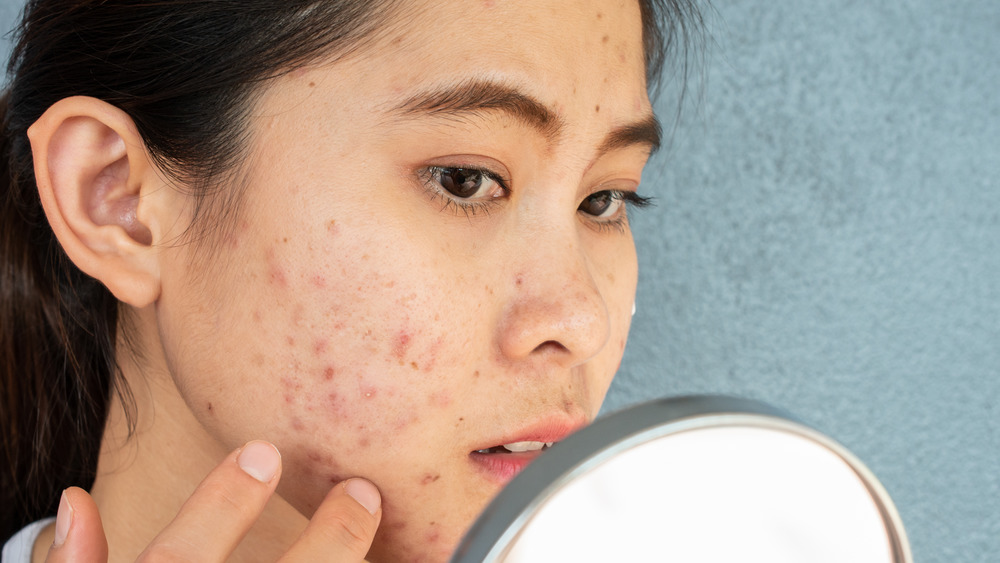Blame Your Parents If You Have Any Of These Health Issues
Raise your hand if you've ever blamed your parents for anything. Your sweet tooth, poor handwriting, inability to do complex fractions, or your dislike of broccoli — they're all fair game. But what about more serious matters, like health issues? Let's at least be accurate when we point fingers. Before we take a look at what conditions those might include, here's a refresher on how genetics work.
We inherit pairs of genes from our parents, and we're stuck with them (the genes and our parents). Dominant diseases only need one gene mutation, while recessive diseases must have a DNA mutation on both copies of a gene. As the Centers for Disease Control and Prevention (CDC) explained, "If both parents have one copy of the mutated gene, each child has a 25 percent chance of having the disease even if neither parent has it." There are also "complex diseases," which are "caused by both genes and environmental factors," as defined by the CDC.
Okay, let's get to it! What health issues can we actually blame our parents for?
You can blame your parents for your skin issues
While some people may get by with a few pimples here and there, others may have more serious breakouts. And acne doesn't just pop up in puberty. Regardless of when in your life you get it, if one or both of your parents had severe acne that left them with scarring, you're at a higher risk of developing similarly painful acne, the American Academy of Dermatology Association revealed.
If you have fair skin and blush easily, you're also at a greater risk for rosacea, a chronic condition in which the face flushes or is red. A National Rosacea Society survey conducted in 2018 found that rosacea often runs in the family. A survey taken some years earlier also found that "people of some nationalities are more likely than others to develop the disorder."
Skin cancers, like melanoma, can run in families, according to the Skin Cancer Foundation, with one in every 10 patients having a family history. "If one or more close biological relatives had melanoma, you are at increased risk," the Skin Cancer Foundation continued. Other genetic risk factors for melanoma include having fair skin, red hair, a tendency to sunburn, and atypical moles.
Your (poor) oral health can also be blamed on your parents
There are five oral health issues that can run in the family, Delta Dental said: gum disease, tooth decay, oral cancer, misaligned teeth, and a cleft lip or cleft palate. If you know about your heightened risk, you may be able to protect against developing an oral health problem.
When it comes to gum disease, aka periodontal disease, up to 30 percent of the population may be "genetically predisposed" to it, according to Delta Dental. That's no small number, but early diagnosis and treatment is helpful. If your genes put you at a higher risk for cavities, prescription toothpastes or rinses may help. Thankfully, genetics only play a minor role in oral cancer. If you are genetically predisposed to oral cancer, though, "you can lower your risk by quitting tobacco, cutting back on alcohol and eating a balanced diet," advised Delta Dental.
If your parents complained about paying for your braces, call it karma; their parents likely had to do the same. And, lastly, as for a cleft lip or palate, "babies of Asian, Latino, and Native American descent are the most likely to be born with a cleft, as are children whose parents themselves had a cleft lip or palate," said Delta Dental.
Bad heartburn can also be hereditary
In 2003, the BBC News reported on researchers' findings that genes play a large role in the conditions that causes heartburn, acid reflux and gastroesophageal reflux disease (GERD). This also means having an increased risk of esophageal cancer. The good news is the lead researcher stressed that environmental factors are equally or more important, like being careful about what you eat.
Additionally, physician Princess Ogbogu told The Healthy that eosinophilic esophagitis can run in families. It's an allergic condition that results in chronic inflammation of the esophagus. It can feel like or cause acid reflux. Barrett's esophagus, a condition The Healthy described as "linked to reflux and esophageal cancer," may also be genetic. Three different genetic mutations are to blame — which means your parents might be too.
However, the study that noted the mutations pointed out that the majority of people who have Barrett's esophagus and esophageal cancer didn't get it from genetics but risk factors like age, smoking, heavy drinking, and being male (via WebMD).
Seasonal allergies may be from your parents
If you react to allergens in the air with itchy, watery eyes, sneezing, or a runny nose, you may have hay fever. This common allergy is also known as a seasonal allergy or allergic rhinitis and can be caused by pollen. It affects 400 million people worldwide, and is even rising in westernized countries, according to a 2018 study in Nature Genetics. This large study took the data of almost 900,000 participants and found that genes may increase the risk of developing allergy symptoms. Environmental exposure is also a factor. The abstract explained that researcher found "a total of 41 risk [locations] for allergic rhinitis, including 20 [locations] not previously associated with allergic rhinitis."
The Nemours Foundation boiled it down: While the tendency to develop allergies is frequently hereditary, it isn't a sure thing. It's not like you inherit a certain type of allergy, but rather the likelihood of having allergies.
Your parents may literally be giving you headaches
Sure, you might be annoyed by your parents, but do they literally give you a headache? Or more specifically, migraines? A migraine is more severe than a regular headache, and unfortunately, it's also hereditary. The American Migraine Foundation explained that "if one or both of your parents get migraines, there's a 50-75% chance you will too."
The chances are also higher with aura and hemiplegic migraine, according to a 2019 study in Current Opinion in Neurology. The study also found that there's a genetic connection between migraine and other brain disorders like depression, attention deficit hyperactivity disorder, and epilepsy. "A stronger family history of migraine is associated with lower age-at-onset, higher frequency, and number of medication days and the migraine with aura subtype," the study concluded.
Many triggers exist for people with migraines, like sleep deprivation, stress, alcohol, and barometric pressure changes. But "some aspects of the altered brain biology are likely to be genetically predetermined," a 2019 study in The Journal of Headache and Pain reported.
Diabetes can be traced back to your parents
There are two different kinds of diabetes: type 1 and type 2. Their causes differ but one thing is the same in both: "You inherit a predisposition to the disease, then something in your environment triggers it," the American Diabetes Association (ADA) said. Typically, both parents pass along risk factors in type 1. Caucasians have the highest rate of this kind of diabetes. In comparison, type 2 diabetes "has a stronger link to family history and lineage and studies of twins have shown that genetics play a very strong role," the ADA said. Lifestyle is influential, however.
Thankfully, researchers are better able to predict the odds of getting diabetes based on specific genes and ethnic groups. In fact, a 2018 study of families "with rare blood sugar conditions revealed a new gene thought to be critical in the regulation of insulin, the key hormone in diabetes," Science Daily reported. This will help shape future treatments.
Your parents may be responsible for certain mental disorders
All major psychiatric disorders have a genetic component, Psychology Today said. There are stats to go along with this statement. "Anxiety disorders, PTSD, OCD, and major depressive disorder are about 20-45% inherited, alcohol dependence and anorexia nervosa are 50-60% inherited, whereas bipolar disorder, autism spectrum disorders, schizophrenia, and ADHD are upwards of 75% inherited," Psychology Today continued.
It's important to keep in mind that inheriting a gene may merely mean inheriting a susceptibility. There's also much variation and complexity. A 2013 study in the Lancet highlighted by the National Institutes of Health found common genetic factors in five mental disorders: autism, ADHD, bipolar disorder, major depression, and schizophrenia. Study co-author Dr. Jordan Smoller said while this is "statistically significant, each of these genetic associations individually can account for only a small amount of risk for mental illness." This means that diagnosing specific conditions with these variations isn't possible yet, but any information helps researchers going forward.
Eating disorders have genetic factors
Eating Disorder Hope explained that "certain identified chemicals in the brain that control hunger, appetite, and digestion have been found to be unbalanced" in some people with eating disorders. Studies have also shown that a predisposition toward eating disorders can be partly from genetics. "Those that are born with specific genotypes are at a heightened risk for the development of an eating disorder," Eating Disorder Hope continued. "Those who have a family member with an eating disorder are 7-12 times more likely to develop an eating disorder."
Certain personality traits like obsessive thinking, hypersensitivity, perfectionistic tendencies, impulsivity, and rigidity are associated with some genes that contribute to eating disorders, Eating Disorder Hope reported. Although environmental factors also come into play, it's thought that 50-70 percent of eating disorders have a genetic component. As if this wasn't enough, alcoholism and eating disorders might even share some of the same genes.
If you are struggling with an eating disorder, or know someone who is, help is available. Visit the National Eating Disorders Association (NEDA) website or contact NEDA's Live Helpline at 1-800-931-2237. You can also receive 24/7 Crisis Support via text (text NEDA to 741741).
Blame your parents if you have high cholesterol
High cholesterol can be dangerous, but even more so for a specific kind caused by a genetic mutation. Familial hypercholesterolemia (FH) is "an inherited disorder that makes it harder for your body to remove low-density lipoprotein (LDL) cholesterol from your blood," explained Johns Hopkins Medicine. It can "drastically increase the risk of heart attack or stroke at a very early age."
This condition is found most often in people who are of French Canadian, Afrikaner, Ashkenazi Jewish, or Lebanese descent. The scary part is that "more than 90 percent of people who have it haven't been diagnosed," Johns Hopkins Medicine said, encouraging people to pay close attention to their family history.
Has a man in your family had any heart issues before age 55? Or a woman before age 65? You might be at risk. Additionally, if both of your parents have this condition, you will most certainly have it. If only one of your parents has it, there's a 50 percent chance it was passed to you, Johns Hopkins Medicine explained. The FH Foundation even noted that there are over 2,000 known variants for FH, and how many mutations you inherit affects which type of FH you may have.
Heart disease has a genetic link
Family history is important when it comes to heart disease and stroke. In this case, it's more of a predisposition. The American Heart Association shared other genetic factors that can elevate risk, like being African American or Hispanic. There are a couple common heart diseases that can be inherited, in addition to familial hypercholesterolemia (FH), according to Penn Medicine: familial hypertrophic cardiomyopathy and familial dilated cardiomyopathy.
A 2013 study in Circulation found that on average, half of one family's members with a dominant heart condition will develop the disease. This affects men and women equally. "Because immediate, or first-degree, family members of a person with an autosomal dominant condition each have a 50 percent risk of inheriting the gene mutation that causes the family's condition, they should be evaluated by an experienced cardiologist to see if they are affected," the study advised. "If a person is diagnosed with the condition, the first-degree relatives of that person should then be evaluated — a process called cascade screening."
You can blame your parents for colon cancer
Several risk factors are attributed to colon cancer, most of them lifestyle-related. Compared to other cancers, links between this cancer and diet, weight, and exercise, are stronger, according to the American Cancer Society. Those are things you can change. But if you have an immediate blood relative who has had colorectal cancer, you'll be at an increased risk. If that relative was diagnosed before age 50, or if there's more than one immediate blood relative who has had it, your odds are even higher, the American Cancer Society said.
"Most colorectal cancers are found in people without a family history of colorectal cancer," the American Cancer Society noted, but "as many as 1 in 3 who develop it have other family members who have had it."
Racial and ethnic background are factors. Of all the racial groups in the U.S., African Americans have the highest incidence and mortality rates of colorectal cancer, and Ashkenazi Jews have the highest risk of any ethnic group in the world, according to the American Cancer Society.
Your parents may be to blame for your asthma
Asthma is a common condition that affects the airways and, thus, breathing. There are two types: allergic and non-allergic. The American College of Allergy, Asthma & Immunology said that asthma is so common, it affects an estimated 26 million people in the U.S. alone. Three-fifths of all asthma cases are hereditary, WebMD noted. If your mom or dad has asthma, you are three to six times more likely to have asthma, according to the CDC (via WebMD).
A 2015 study in European Clinical Respiratory Journal discussed the genetics. One finding: "Individuals with early-onset asthma most frequently have a family history of asthma than do those with later-onset asthma, suggesting that genes influence the age at onset of the disease." Severity is also affected by family history.
Asthma is complex, however. Over 100 different genes have been linked to the condition, according to The Tech Interactive. It only takes a small change in these genes to increase someone's risk. Because of this, predicting asthma isn't an exact science.
Celiac disease can be blamed on your parents
Celiac disease is an autoimmune disease in which the body is unable to tolerate gluten. It damages the small intestine and if left unchecked, can lead to serious risks like infertility, osteoporosis, multiple sclerosis, or cancer. When someone is diagnosed with the disease, other family members should be tested because they are also at an increased risk. BeyondCeliac.org said it occurs in up to 5-10 percent of family members. In other words, if you have an immediate blood relative with celiac, you have a 1 in 10 risk of developing it (via Celiac Disease Foundation).
BeyondCeliac.org also noted that about 95 percent of people with celiac have the HLA-DQ2 gene, with most of the remaining 5 percent having the HLA-DQ8 gene. The gene just means you're more susceptible to developing the disease.
It's also important to remember that autoimmune diseases like to hang out together. If you have one, you're more likely to get another. Interestingly, the earlier the diagnosis of celiac disease, the lower the chances of developing another condition, the Celiac Disease Foundation explained.
You can blame your parents for breast cancer
Did you know that about 5 to 10 percent of breast cancers are hereditary? And you can get it from either parent. Most inherited cases are associated with one of two gene mutations: BRCA1 or BRCA2, BreastCancer.org stated, accounting for up to 10 percent of all breast cancers. But just having one of these mutations isn't a surefire diagnosis; other mutations and family history are factors.
You're more likely to have one of these genetic mutations if you have blood relatives who've been diagnosed with breast cancer before the age of 50, breast and ovarian cancer on the same side of the family or in one person, a relative with triple-negative breast cancer, other cancers in the family, female family members with cancer in both breasts, Ashkenazi Jewish heritage, or a male family member with breast cancer, according to BreastCancer.org.
Unfortunately, having one of the BRCA gene mutations also means "an increased risk of developing ovarian, colon, and pancreatic cancers, as well as melanoma," said BreastCancer.org. Men with one of the BRCA mutations are at higher risk for prostate cancer.















